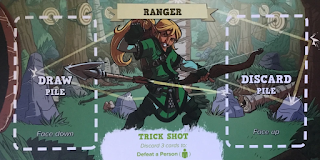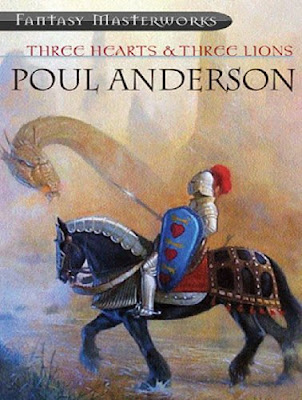“I apologize for such a long letter - I didn't have time to write a short one.” ― paraphrased from Blaise Pascal.
One of the nice things about good books is that they are (usually) condensed and filtered information. I don't mean that they summarize information - although they often do that too - but that they give proper importance/attention to the most relevant information.
If this is not intuitive, let me give you an example (we'll get to RPGs eventually).
I've read The Brothers Karamazov recently. How does that compare to this year's best seller? I have no idea, haven't read it (nor heard Colleen Hoover before last week). However, it has been filtered by space and time. Of all the books of all times and places, someone decided to translate it from Russian, and keep it available in 2022, more than a century after publication. And it is still available because people are still buying, reading, and discussing book. Each one of these people has cast a vote so that the book can be in my hands (also, see Lindy effect).
It is a very good book, obviously, but it is long and also takes some effort (despite not being particularly hard to read). Reading it takes more time than casting a vote to choose a president, even if you have to cross an entire city to vote. People that read that book have more skin in the game, since they've invested a lot of their valuable time to read it.
Sturgeon's law - "ninety percent of everything is trash"
Writing a book isn't hard - writing a book with the same quality of The Brothers Karamazov is very hard. It is not necessary, however, to make money as a writer. You can sell trash, and with good marketing and presentation you can sell lots of trash.
And, according to Sturgeon's law, ninety percent of everything is trash. Certainly, at least 90% of all books published in the last year.
This law talks about quality - but I'm currently more concerned with redundancy.
As far as RPGs are concerned, even the best are 90% repetition of old formulas, old editions, or simply old text - often copied and pasted from the SRD.
D&D 5e, for example, far from being the worst offender, repeats the same text (e.g., darkvision) though the book. The same features are repeated verbatim in different races/classes. And most lore is copied from old editions, sometimes adapted to modern sensibilities. There are still some original parts: advantage/disadvantage, proficiency bonus, etc. But many rules (e.g., falling damage) are just copied from old editions without reflection.
The OSR is sometimes worse. Huge swaths of text copied from old editions or directly from the SRD with no reflection at all. I often mention the B/X cleric and the fact that plate armor costs the same as 12 garlic as examples. There are troves of B/X clones out there (I have my own) - do they bring anything to the table, or are just 90% trash/repetition with one or two new ideas?
The SRD
A brief aside: I think the SRD is a great idea and a net positive for the hobby. I dislike pasting text without reflection, but rewriting text and mechanics just because you cannot paste them is a complete waste of time.
The 1.1 SRD sounds like bad news for the hobby and probably means that Kobold Press and others that produce great third-party content for 5e will be hindered in their efforts. Most people will stick to 1.0, which is bad news for 5.5e/6e (remember the 4e GSL?).
I was able to publish 5e stuff only because of the SRD. I will not publish under 1.1 (or GSL, or DM's Guild) at this time, and I'm unsure if I'll write more 5e stuff in the future (or play 5e at all), for various reasons.
Condensed information in RPGs
When I started writing Dark Fantasy Basic, I went trough every page of Moldvay's Basic to see if I had anything to change or add. In some cases, I re-wrote the same page twice, posted online, tried to get more people to discuss it - or even add their own pages.
DFB is the most condensed version of B/X I could write at the time - and, still, it has lots of rooms for improvement. I didn't add monsters or even races to the book. I had nothing to add at the time (although eventually I published the Teratogenicon, my treatise on monsters), and I didn't want to simply copy existing rules.
This is one form of condensing information - through reflection, rewriting, etc. Another important methods is playtesting. A playtested rule is superior in quality to an untested rule. Repeated used is a filter, somewhat similar to an old book surviving rough centuries.
Proofreading, revision, good alpha readers and consultants, etc., are different tools to add quality to your text. Prior experience (with writing or playing different games) is also helpful.
It is possible that you are a genius and can write the best RPG supplement from scratch, in a stream of consciousness. But it is unlikely.
Presentation is extremely important. The same information can be presented in different ways, some much more efficient than others (I've ranted about how 90% of the monsters from de 2e MM have three lines describing "Special Defenses: Nil" and "Magic Resistance: Nil", for example). THAC0 is an example, and Target 20 is even better, to the point that I think most of our discussions about OSR should use Target 20 rather then B/X as a starting point.
My perfect RPG would be extremely condensed, play tested, etc. If there is a rule for falling damage, an effort has been made to make it sensible. If the glaive and halberd are different weapons, there NEEDS to be something to differentiate them. And so on. Every rule in the books should have a clear motive to be there.
Condensed information in blogs
A "condensed" blog would include some rewriting, revision, updates, hyperlinks and so on. You could also remove references to sales that are already finished and other obsolete information. A great blog could contain posts that are 10 years old and are still relevant. I'm doing my best to create get as close as I can to that ideal. Realistically, however, I think most people do not read or discuss old blog posts. So maybe I should do something like my friend Jens and write a compilation of selected/revised blog posts.
AI, filler, and the big picture
When current AI tools became available for art, I thought artists that create decorative art would soon be obsolete. And most my books (Teratogenicon being the exception) use decorative art - stock art, PD art, etc. It is there to make the book look good, not to illustrated a particular idea. This is sometimes called "filler" - it is there to fill space.
Now, AI is writing text. Random tables, adventure seeds, etc. The results are equally "filler" - for now, AI cannot write creative stuff by itself.
The problem is that, as explained above, most RPG text is filler. You could easily create an AI-RPG with 10% cool ideas and 90% AI-generated trash and it would be somewhat similar in innovation to many OSR products.
(Another aside: I would NEVER add pure AI text to my books, but maybe one day use it as a tool? Not sure. For now, I also prefer using art form actual artists rather than AI, while I understand that AI art might make it easier for indie publishers to create some cool covers, etc.).
This is not only about RPGs. I've seen posts on social media and even received a couple of e-mails written by AI (not merely "bots" or "spammers"; these LOOKED like the real thing at a first glance). I've seem social media posts from actual people that were apparently written by AI - long texts with lots of "it is understandable", "it is important to consider", etc. And, since social media relies on likes/dislikes (or, worse, VIEWS) instead of true/false, there is an endless torrent of trash information coming for us - now with the help of AI that doesn't mind creating useless/incorrect stuff.
In short, the thing that worries me the most at this moment (let's worry about Skynet in a couple of years) is the amazing pile of trash that AI will bring into existence. PKD predicted something analogous in Autofac.
I think one example from Reddit would be useful:
Explain the key features of 3.5 edition Dungeons & Dragons.3.5 edition Dungeons & Dragons was released in 2003 and is an update to the 3rd edition rules. The key features of this edition include minor rules changes, the addition of prestige classes, and the inclusion of the Monster Manual.Explain the key features of 4th edition Dungeons & Dragons.4th edition Dungeons & Dragons was released in 2008 and is the fourth edition of the game. The key features of this edition include a focus on tactical combat, the use of encounter levels to measure a party's progress, and the use of miniatures.Explain the key features of 5th edition Dungeons & Dragons.5th edition Dungeons & Dragons was released in 2014 and is the fifth edition of the game. The key features of this edition include a simplified ruleset, the return of character levels, and the use of polyhedral dice.
See what I mean? Some parts even make sense (4e, tactical combat and minis), but they are mixed with nonsense with no clear distinction.
One could write an entire blog with this trash. It would never become a reliable source, but might just attract enough views to make the (negligible) effort worth it.
News, encyclopedic information, book reviews... creating misinformation has never been easier.
Chronological irrelevance
A brief aside.
We are currently flooded with media that are better described as "quickly obsolete" rather than "bad" or "useless". I don't have the data, but I've heard that 80-90% of the videos being watched on YT were created in the last 24 hours. They will probably be forgotten with similar brevity. They do not matter.
A similar effect happens with the 24-hour news cycle, but the current situation seems much worse.
I don't know wether this is some kind of "planned obsolescence" or some unintended side effect of the algorithm, but I'm quite sure we are wasting a huge amount of time, with no positive results (except for people in Meta, Google, etc. filling their pockets).
Using AI and SRD to condense information
It doesn't have to be this way. Both AI and the SRD can be used to IMPROVE the average quality of stuff. AI could be a great tool for proofreading, for example, and computer algorithm might help play testing immensely. There will soon be specialist AI-artists that will do wonders with AI plus Photoshop (remember when Photoshop was created? a similar revolution is coming).
Similarly, instead of just pasting from the SRD, we can have multiple iterations of the same rules, endlessly refined and corrected. We can create a commented SRD, with criticism from multiple authors. We can use likes/dislikes to make a "popular vote" D&D, or cut down useless rules to create a minimalist D&D. The Black Hack, Knave, and Dungeon World are some examples on how to build creative stuff over existing games.
Separating the wheat from the chaff will always be a challenge - and THIS is what we should be thinking about, IMO.
AI, ethics, and legality
Not exactly a conclusion, but a few random thoughts.
I dislike the idea of using art from other people without giving them due credit and compensation on principle. AI art uses existing art in their algorithms in this precise manner. I do not think, however, that this is (or should be) illegal - at worst, it is tantamount to tracing, and it creates results that are often more original than tracing.
I also think that the advance of this technology is inevitable. And, because of this, I think we should make sure that everyone has equal access to these tools. Instead of creating hurdles, I say let's spread this far and wide. Instead of letting a few mega-corps benefit from the technology, we could make it available for small artists, creators, etc. Also, make it transparent o we know which artists are being used by AI... whenever possible.
(Also: things will move a lot faster than you think. I would bet that the majority of new RPGs published in December 2023 will be created with some AI assistance. In some cases, we might not even notice).
Intellectual property, wether you like it or not, benefits mega-corps more than it benefits artists. Disney has lobbyists to make IP last forever, and lawyers to enforce IP. I have about a dozen books... if there was no such thing as IP, I think I would still have some readers supporting me - AND I might be publishing D&D stuff, even a "corrected" version of 5e if I could. I would hire an actual artist to make the cover.
I don't make a living on IP, and I understand the concern of those who do. I do not think we can regulated ourselves out of this mess. Instead, I think more regulation might make things worse - Disney might no longer need as many artists but will always use lots of lawyers.
There is much more to discuss about this topic. For now, I'll just say that I feel that we are jumping into a hole without bothering to measure its depth.
Related posts:
https://methodsetmadness.blogspot.com/2021/04/information-overload-organizing-creating.html
https://methodsetmadness.blogspot.com/2021/04/monster-stats-minimalism-x-efficiency.html














